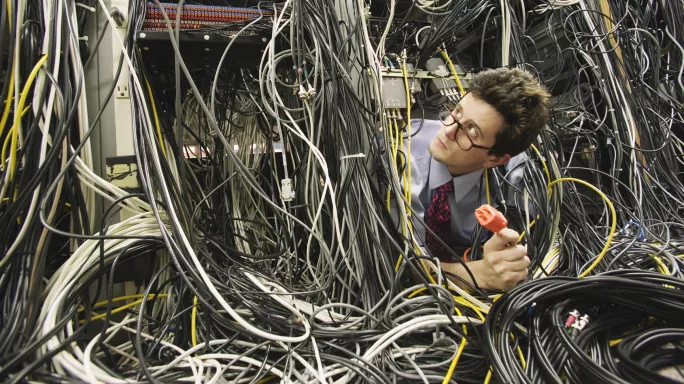
- Home
- Why there is no such thing as an unteachable child
Why there is no such thing as an unteachable child

“The notion of an unteachable child, that is nonsense,” says Dr Simon Edwards, senior lecturer at youth studies at the University of Portsmouth. “There is no such thing.”
Edwards’ view comes from extensive experience: he has worked across the education spectrum, from mainstream teacher to being a teacher in alternative provision, and is now a researcher working with children deemed even too tough for pupil-referral units.
Speaking on this week’s Tes Podagogy, he talks at length about why children get excluded, why he thinks no child is unteachable and how we can best support these young people.
One thing he is certain of is that exclusions are too high and that many children get excluded for the wrong reasons. But he does believe that schools sometimes have little choice but to exclude.
“Yes, too many children are getting excluded. And no it is not always for the right reasons,” he says. “[But] I do think sometimes you don’t have a choice.
“Safety-wise, there are definitely young people who have such severe issues and things going on at home that they just can’t cope in a mainstream classroom with 30 odd other kids. I have worked in that situation as a teacher, and so I understand the issues there.
The impact of school exclusions
“We can’t put some of these young people on an industrialised, conveyor belt way of teaching. They simply don’t fit that model; they aren’t compliant enough to be able to do that.”
Quick read: 5 steps to reducing exclusions
Quick listen: How schools create bullies
Want to know more? How attachment theory helps behaviour
“A young person I worked with had such a lot going on with their own medical problems and issues that they were smashing their kitchen up,” says Edwards. “If he had been in a school, he could have been doing that to other kids. So yes, there is a time when they [need to be taken out of that situation].”
This does not, however, make that child unteachable, he adds.
“I think there are a series of coinciding events that sometimes occur in a classroom that lead to that child not being able to engage in the classroom with learning. But I have never come across a child who genuinely cannot be taught anything or who will not listen to you if you respect them.”
The vast majority of exclusions, he believes, push all the fault of exclusion on to the child, when there is always more to it.
“I think what we do with exclusions is place the issue on the young person as having some deficit. It does not address the systems that create that [deficit].
“If we have behaviour policies that do not take into account wider issues, that puts some people at a disadvantage before they even get in the school gates,” he says.

“I was interviewing some children in a school and they said, ‘We get a behaviour point for not having a pencil in the morning. We get a behaviour point for having the wrong colour shoes on. We get a behaviour point for not having a top button done up. And when we get three behaviour points, we have a half-day exclusion.’ And I was left thinking, ‘How is not having a pencil a behaviour?’
“There are these actions that are being turned into moral actions and then are laid on the student… if you have a single mum who is working three jobs trying to bring up the child and another child, this young person probably gets himself up, gets himself dressed, gets himself breakfast and gets himself to school. He is thinking about what to get for dinner that night; the last thing they are going to think about is their pencil.
“But one of the problems of marketisation [in education] is that it is all about ‘me first’ - about getting the grades and league table position - so your whole job is to stop anything that stops you being inefficient so you can get to the top of the ladder. Exclusion has become a mechanism that enables that to happen.”
Blaming children and parents
Edwards says that these children are often labelled as having several associated issues: low aspirations being the main one. This is something that “really annoys” him.
“I have had headteachers, particularly in low-income areas, who say kids need to have grit and determination and they need to raise their aspirations. I am like: what are you on about?
“These young people who I work with want to be like their parents. A builder or a hairdresser. Or doing admin. They have aspirations; you are just saying you want them to have the same aspirations as a middle-class child.
“But if you have a middle-class child who wants to be a doctor or a teacher like their own parents, then actually they might not have high aspirations. Their aspirations may actually be lower if you consider where they are starting from. So don’t tell me a kid has not got aspirations.”
He says that the notion children do not respect education is also false.
“Every child I have met wants an education - I did some research with non-attenders and every child valued education,” he explains.
“But the learning in school they did not value. Something about education is not coming through. Is that education offer really transformative? Do they think they can use that to help them become what they want to be?”
Understanding communities
A failure to really understand communities involved with the school can be at the root of this issue, Edwards says.
“I had a conversation with a head recently. They came in and they said they needed to deal with the situation of children being rude to staff, etc, and, of course, it is not acceptable for them to be rude and they cannot teach in that situation. But they excluded (fixed-term) 65 kids in three weeks,” he explains.
“He said he needed to set the line. I said to the headteacher, in my experience the parents will take the hit once and try and buy into the system. But as soon as it does not work, as soon as the kid gets excluded again, and mum has to come out of her job to deal with it, all you do is build up resentment. You are placing all the blame on the child.
“Could you work with that young person in another way, or vary the curriculum so it is more appropriate. Then it would be a more inclusive environment and that young person may actually begin to do those things. it has to be two-way. In order to effect change, you have to let them be part of the process.
“What we are doing instead is having the mentality of ‘I am the teacher, therefore you respect me’ - this distancing technique.“
He believes this distancing technique is most prominent when it comes to parents. So often, he says, when a child is excluded, the blame is put on the parents.
It is thought that the parent does not want to help, or that the parent does not have high aspirations for their child. That is not true, he argues.
“What happens is the parent becomes part of the problem, not part of the solution,” he says. “I have never come across a parent who did not want the best for their child. When you look at the narrative, you cannot disassociate it from the wider cultural context.
“And when you look at a child’s behaviour in the classroom, you cannot disassociate it from family background. This notion that children and teachers have to leave their baggage at the door - that is bullshit, you can’t do that.”
But that does not mean that the parents are to blame.
“It is not about saying to that parent, ‘You are here to help me do my job.’ And it is not about me saying I am here to help you do your job. What I used to say to parents is, ‘I am not asking you to help me do my job, I am here to serve you and ensure that you and your child can get to where you both want to be in life.’
“What we do in our project is, we say to the parents, ‘You have the capability, you just don’t have the resources.’ Then we work with the parent-carer forum and we guide the parent to the resources available.”
In the podcast, Dr Edwards discusses all of these issues in more detail and also details his highly successful mentoring programme for children who have run out of educational options.
You can listen to the podcast by searching for “Tes - the education podcast” on your podcast platform (including Spotify) or via the player above.
You can read more about the programme and Edwards’ other work in the 12 July issue of Tes
Register with Tes and you can read five free articles every month, plus you'll have access to our range of award-winning newsletters.
Keep reading for just £4.90 per month
You've reached your limit of free articles this month. Subscribe for £4.90 per month for three months and get:
- Unlimited access to all Tes magazine content
- Exclusive subscriber-only stories
- Award-winning email newsletters
You've reached your limit of free articles this month. Subscribe for £4.90 per month for three months and get:
- Unlimited access to all Tes magazine content
- Exclusive subscriber-only stories
- Award-winning email newsletters



